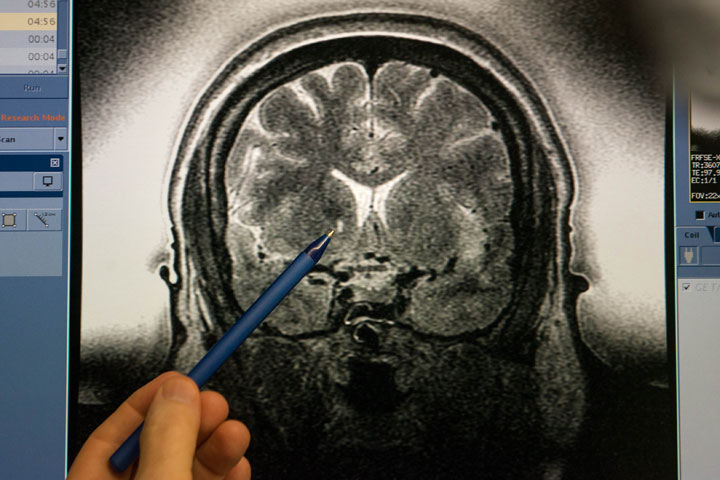Sky Zazlov was hurt on the job in 2011, “and it changed my life, every aspect of my life.”

She was diagnosed with major depression and tried many treatments: medication, cognitive behavioural therapy, and talk therapy, among many others. None seemed to work.
That’s why she decided to participate in a clinical trial at Toronto’s Sunnybrook Health Sciences Centre, where doctors operated on her brain, without a scalpel.
“They explained it to me that they’re going to shave my head, and they’re going to attach a frame to my skull, and they’re going to put me in an MRI machine,” she said in an interview before the surgery.
The medical team is using MRI-focused guided ultrasound to burn a lesion in a part of the brain called the anterior limb of the internal capsule. The goal is to disrupt a pathway of the brain that had been associated with depression. Hopefully, this will reset some neurological circuits that are malfunctioning and causing the depression.
“They’re going to kill tissue. They’re going to burn tissue in my brain to make it work better, to make me okay,” Zazlov said.
Approximately one in five Canadians will have an episode of major depression in their lifetimes, according to Sunnybrook. And some types of surgery have been shown to help.
“Over the last few decades we’re starting to learn that depression is a circuit disorder, which means that we have different regions of the brain that are connected via highways of information,” said Dr. Nir Lipsman, a scientist in Sunnybrook’s Hurvitz Brain Sciences Research Program.
“What happens in depression is these circuits malfunction,” he said. Severing some of those circuits can lead to improvements in mood.
Doctors have done this before through traditional brain surgery, cutting into people’s brains, but using ultrasound to do the same thing is a relatively new innovation. The team at Sunnybrook pioneered a similar procedure to treat people with essential tremor disorder, but this trial is the first of its kind in North America to treat depression.

Get weekly health news
“The idea is to replace, potentially, if it’s safe and effective, an open neurosurgical procedure that we’ve known for some time is effective in some patients with depression.”
It’s very precise, the researchers say, targeting just a tiny part of the brain. The apparatus, which fits around the patient’s skull, is image-guided and can be focused down to a “submillimeter” level, said Lipsman.
This trial will involve six patients, who will be followed after the procedure for one year to assess the severity of their depression and their level of functioning. It’s a phase-1 study, meaning that doctors are mostly interested in evaluating the procedure’s safety. “But we’re definitely interested in efficacy. We’re looking at outcomes. We’re looking specifically at depression outcomes, both as they’re rated by the physician and as they’re rated by the patients themselves,” Lipsman said.

WATCH ABOVE: “I have fear because they’re going into my brain.”
This procedure is only for patients with severe depression who have not responded to any other kind of treatment.
“It’s not so much that the medications don’t work for them; it’s that they can’t tolerate the medications. The medications cause unacceptable side effects,” said Dr. Anthony Levitt, chief of the Hurvitz Brain Sciences Program.
“When you don’t have the option of medications, where do you turn? This kind of procedure with neuromodulation, we’re adjusting the brain directly and it allows us to give people a longer term solution that doesn’t require the same side effects they might get with medication.”
Zazlov might not see results for a few months, he said. “It’s not as if our patient is going to wake up tomorrow and feel fabulous, although we won’t complain if she does. But the far more likely outcome is over the next couple of months, her mood will change. It will adjust, and by six to 12 months, you’ll be a seeing a dramatic turnaround, significant reductions in anxiety and improvements in depressive symptoms.”
Zazlov was aware of the risks. Aside from the risks of having brain surgery — scalpel or not — she might not respond to the treatment. “They don’t know, which is why the study is so important because hopefully, I can help them learn and help them know so that other people can be better.”
Although she was scared, she was hopeful too.
“I would like to have a day where I wake up and not feel hopeless and not feel that today is the day that I need to die, that I know that by waking up and getting out of bed that things are going to be okay, even some small — even a little glimmer that it would be okay. That would be huge,” she said.
“I’m not expecting anything instant,” she said. “Even a five per cent decrease in the hopelessness or the despair — that would be amazing. I could go back to work. I could be okay.”
She had the surgery Tuesday morning, becoming the third patient to receive the treatment.



Comments
Want to discuss? Please read our Commenting Policy first.